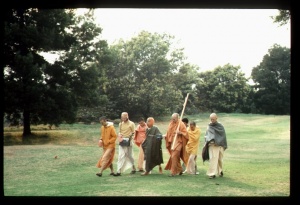CC Antya 13.133 (1975): Difference between revisions
(Vanibot #0027: CCMirror - Mirror CC's 1996 edition to form a basis for 1975) |
(Vanibot #0020: VersionCompareLinker - added a link to the Version Compare feature) |
||
| Line 2: | Line 2: | ||
<div style="float:left">'''[[Sri Caitanya-caritamrta (1975)|Śrī Caitanya-caritāmṛta (1975)]] - [[CC Antya (1975)|Antya-līlā]] - [[CC Antya 13 (1975)|Chapter 13: Pastimes with Jagadānanda Paṇḍita and Raghunātha Bhaṭṭa Gosvāmī]]'''</div> | <div style="float:left">'''[[Sri Caitanya-caritamrta (1975)|Śrī Caitanya-caritāmṛta (1975)]] - [[CC Antya (1975)|Antya-līlā]] - [[CC Antya 13 (1975)|Chapter 13: Pastimes with Jagadānanda Paṇḍita and Raghunātha Bhaṭṭa Gosvāmī]]'''</div> | ||
<div style="float:right">[[File:Go-previous.png|link=CC Antya 13.132 (1975)|Antya-līlā 13.132]] '''[[CC Antya 13.132 (1975)|Antya-līlā 13.132]] - [[CC Antya 13.134 (1975)|Antya-līlā 13.134]]''' [[File:Go-next.png|link=CC Antya 13.134 (1975)|Antya-līlā 13.134]]</div> | <div style="float:right">[[File:Go-previous.png|link=CC Antya 13.132 (1975)|Antya-līlā 13.132]] '''[[CC Antya 13.132 (1975)|Antya-līlā 13.132]] - [[CC Antya 13.134 (1975)|Antya-līlā 13.134]]''' [[File:Go-next.png|link=CC Antya 13.134 (1975)|Antya-līlā 13.134]]</div> | ||
{{CompareVersions|CC|Antya 13.133|CC 1975|CC 1996}} | |||
{{RandomImage}} | {{RandomImage}} | ||
==== TEXT 133 ==== | ==== TEXT 133 ==== | ||
| Line 11: | Line 10: | ||
<div class="verse"> | <div class="verse"> | ||
:vaiṣṇavera nindya-karma nāhi pāḍe kāṇe | :vaiṣṇavera nindya-karma nāhi pāḍe kāṇe | ||
:sabe kṛṣṇa bhajana kare, | :sabe kṛṣṇa bhajana kare,--ei-mātra jāne | ||
</div> | </div> | ||
| Line 18: | Line 17: | ||
<div class="synonyms"> | <div class="synonyms"> | ||
vaiṣṇavera—of the Vaiṣṇava; nindya-karma—reproachable activities; nāhi pāḍe kāṇe—he does not hear; sabe—all; kṛṣṇa bhajana kare—are engaged in | vaiṣṇavera—of the Vaiṣṇava; nindya-karma—reproachable activities; nāhi pāḍe kāṇe—he does not hear; sabe—all; kṛṣṇa bhajana kare—are engaged in Kṛṣṇa's service; ei-mātra—only this; jāne—he understands. | ||
</div> | </div> | ||
| Line 25: | Line 24: | ||
<div class="translation"> | <div class="translation"> | ||
He would not listen to blasphemy of a Vaiṣṇava, nor would he listen to talk of a | He would not listen to blasphemy of a Vaiṣṇava, nor would he listen to talk of a Vaiṣṇava's misbehavior. He knew only that everyone was engaged in Kṛṣṇa's service; he did not understand anything else. | ||
</div> | </div> | ||
| Line 32: | Line 31: | ||
<div class="purport"> | <div class="purport"> | ||
Raghunātha Bhaṭṭa never did anything harmful to a Vaiṣṇava. In other words, he was never inattentive in the service of the Lord, nor did he ever violate the rules and regulations of a pure Vaiṣṇava. It is the duty of a Vaiṣṇava ācārya to prevent his disciples and followers from violating the principles of Vaiṣṇava behavior. He should always advise them to strictly follow the regulative principles, which will protect them from falling down. Although a Vaiṣṇava preacher may sometimes criticize others, Raghunātha Bhaṭṭa avoided this. Even if another Vaiṣṇava was actually at fault, Raghunātha Bhaṭṭa would not criticize him; he saw only that everyone was engaged in | Raghunātha Bhaṭṭa never did anything harmful to a Vaiṣṇava. In other words, he was never inattentive in the service of the Lord, nor did he ever violate the rules and regulations of a pure Vaiṣṇava. It is the duty of a Vaiṣṇava ācārya to prevent his disciples and followers from violating the principles of Vaiṣṇava behavior. He should always advise them to strictly follow the regulative principles, which will protect them from falling down. Although a Vaiṣṇava preacher may sometimes criticize others, Raghunātha Bhaṭṭa avoided this. Even if another Vaiṣṇava was actually at fault, Raghunātha Bhaṭṭa would not criticize him; he saw only that everyone was engaged in Kṛṣṇa's service. That is the position of a mahā-bhāgavata. Actually, even if one is serving māyā, in a higher sense he is also a servant of Kṛṣṇa. Because māyā is the servant of Kṛṣṇa, anyone serving māyā serves Kṛṣṇa indirectly. Therefore it is said: | ||
:keha māne, keha nā māne, saba tāṅra dāsa | :keha māne, keha nā māne, saba tāṅra dāsa | ||
:ye nā māne, tāra haya sei pāpe nāśa | :ye nā māne, tāra haya sei pāpe nāśa | ||
"Some accept Him, whereas others do not, yet everyone is His servant. One who does not accept Him, however, will be ruined by his sinful activities." (Cc. Ādi 6.85) | |||
</div> | </div> | ||
Latest revision as of 21:53, 26 January 2020

A.C. Bhaktivedanta Swami Prabhupada
TEXT 133
- vaiṣṇavera nindya-karma nāhi pāḍe kāṇe
- sabe kṛṣṇa bhajana kare,--ei-mātra jāne
SYNONYMS
vaiṣṇavera—of the Vaiṣṇava; nindya-karma—reproachable activities; nāhi pāḍe kāṇe—he does not hear; sabe—all; kṛṣṇa bhajana kare—are engaged in Kṛṣṇa's service; ei-mātra—only this; jāne—he understands.
TRANSLATION
He would not listen to blasphemy of a Vaiṣṇava, nor would he listen to talk of a Vaiṣṇava's misbehavior. He knew only that everyone was engaged in Kṛṣṇa's service; he did not understand anything else.
PURPORT
Raghunātha Bhaṭṭa never did anything harmful to a Vaiṣṇava. In other words, he was never inattentive in the service of the Lord, nor did he ever violate the rules and regulations of a pure Vaiṣṇava. It is the duty of a Vaiṣṇava ācārya to prevent his disciples and followers from violating the principles of Vaiṣṇava behavior. He should always advise them to strictly follow the regulative principles, which will protect them from falling down. Although a Vaiṣṇava preacher may sometimes criticize others, Raghunātha Bhaṭṭa avoided this. Even if another Vaiṣṇava was actually at fault, Raghunātha Bhaṭṭa would not criticize him; he saw only that everyone was engaged in Kṛṣṇa's service. That is the position of a mahā-bhāgavata. Actually, even if one is serving māyā, in a higher sense he is also a servant of Kṛṣṇa. Because māyā is the servant of Kṛṣṇa, anyone serving māyā serves Kṛṣṇa indirectly. Therefore it is said:
- keha māne, keha nā māne, saba tāṅra dāsa
- ye nā māne, tāra haya sei pāpe nāśa
"Some accept Him, whereas others do not, yet everyone is His servant. One who does not accept Him, however, will be ruined by his sinful activities." (Cc. Ādi 6.85)